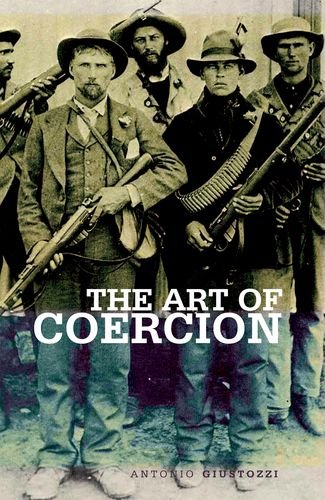Artículos relacionados a Art of Coercion: The Primitive Accumulation and Management...

Sinopsis
In today's dominant discourse of liberal interventionism, the role of coercion and the monopoly of violence have been neglected, argues Antonio Giustozzi, an analyst justly renowned for his research and writing on the Taliban. It is widely assumed that a functional, liberal state can emerge out of a political settlement between warring parties based on political inclusiveness and a social contract, which involves pressuring political actors to reach a deal. But the post-Cold war experience of such deals has been so disappointing that a re-examination of these 'certainties' is warranted. Giustozzi contends that a key source of such flawed analyses is widespread confusion over what state formation and state-building involve. In his view, completely different 'rules of the game' apply to the two. Naked coercion is a key component of state formation, and very few states were formed without recourse to it. In contrast, the history of state consolidation after their initial formation is one of taming violence and creating increasingly sophisticated way of managing it.The Art of Coercion offers a new approach to thinking about the role of security forces, in their broadest sense, in this transition between state formation and state-building. While focussing largely on the nineteenth and twentieth centuries, Giustozzi discusses coercive power throughout history, from the Carolingian empire to the Boer War, from Zapata's Mexico to China's Warring States. He scrutinises the role of armies, guerrilla bands, mercenaries, police forces and intelligence services, analyses why some coups fail and some succeed, and examines the ways in which the monopoly of violence decays.
"Sinopsis" puede pertenecer a otra edición de este libro.
Acerca del autor
Antonio Giustozzi is a Research Fellow at IDEAS, London School of Economics.
"Sobre este título" puede pertenecer a otra edición de este libro.
EUR 17,06 gastos de envío desde Estados Unidos de America a España
Destinos, gastos y plazos de envíoComprar nuevo
Ver este artículoEUR 17,06 gastos de envío desde Estados Unidos de America a España
Destinos, gastos y plazos de envíoResultados de la búsqueda para Art of Coercion: The Primitive Accumulation and Management...
Art of Coercion : The Primitive Accumulation and Management of Coercive Power
Librería: GreatBookPrices, Columbia, MD, Estados Unidos de America
Condición: New. Nº de ref. del artículo: 19504971-n
Cantidad disponible: 19 disponibles
Art of Coercion : The Primitive Accumulation and Management of Coercive Power
Librería: GreatBookPrices, Columbia, MD, Estados Unidos de America
Condición: As New. Unread book in perfect condition. Nº de ref. del artículo: 19504971
Cantidad disponible: 19 disponibles
The Art of Coercion: The Primitive Accumulation and Management of Coercive Power
Librería: Revaluation Books, Exeter, Reino Unido
Hardcover. Condición: Brand New. 1st edition. 256 pages. 5.70x8.60x1.00 inches. In Stock. Nº de ref. del artículo: x-0199327416
Cantidad disponible: 2 disponibles
Art of Coercion : The Primitive Accumulation and Management of Coercive Power
Librería: AHA-BUCH GmbH, Einbeck, Alemania
Buch. Condición: Neu. Neuware - Provides a new approach to thinking about security forces and their relationship to state building by examining the past two centuries of armed conflict. Nº de ref. del artículo: 9780199327416
Cantidad disponible: 2 disponibles
Art of Coercion: The Primitive Accumulation and Management of Coercive Power Format: Hardcover
Librería: INDOO, Avenel, NJ, Estados Unidos de America
Condición: New. Brand New. Nº de ref. del artículo: 9780199327416
Cantidad disponible: 18 disponibles
Art of Coercion: The Primitive Accumulation and Management of Coercive Power
Librería: Kennys Bookstore, Olney, MD, Estados Unidos de America
Condición: New. Nº de ref. del artículo: V9780199327416
Cantidad disponible: 18 disponibles
Art of Coercion: The Primitive Accumulation and Management of Coercive Power
Librería: Lucky's Textbooks, Dallas, TX, Estados Unidos de America
Condición: New. Nº de ref. del artículo: ABLIING23Feb2215580052000
Cantidad disponible: 6 disponibles
Art of Coercion: The Primitive Accumulation and Management of Coercive Power
Librería: Kennys Bookshop and Art Galleries Ltd., Galway, GY, Irlanda
Condición: New. Nº de ref. del artículo: V9780199327416
Cantidad disponible: 18 disponibles
Art of Coercion (Hardcover)
Librería: Grand Eagle Retail, Mason, OH, Estados Unidos de America
Hardcover. Condición: new. Hardcover. In today's dominant discourse of liberal interventionism, the role of coercion and the monopoly of violence have been neglected, argues Antonio Giustozzi, an analyst justly renowned for his research and writing on the Taliban. It is widely assumed that a functional, liberal state can emerge out of a political settlement between warring parties based on political inclusiveness and a social contract, which involves pressuring political actors to reach a deal. But the post-Cold war experience of such deals has been so disappointing that a re-examination of these 'certainties' is warranted. Giustozzi contends that a key source of such flawed analyses is widespread confusion over what state formation and state-building involve. In his view, completely different 'rules of the game' apply to the two. Naked coercion is a key component of state formation, and very few states were formed without recourse to it. In contrast, the history of state consolidation after their initial formation is one of taming violence and creating increasingly sophisticated way of managing it.The Art of Coercion offers a new approach to thinking about the role of security forces, in their broadest sense, in this transition between state formation and state-building. While focussing largely on the nineteenth and twentieth centuries, Giustozzi discusses coercive power throughout history, from the Carolingian empire to the Boer War, from Zapata's Mexico to China's Warring States. He scrutinises the role of armies, guerrilla bands, mercenaries, police forces and intelligence services, analyses why some coups fail and some succeed, and examines the ways in which the monopoly of violence decays. Provides a new approach to thinking about security forces and their relationship to state building by examining the past two centuries of armed conflict. Shipping may be from multiple locations in the US or from the UK, depending on stock availability. Nº de ref. del artículo: 9780199327416
Cantidad disponible: 1 disponibles

